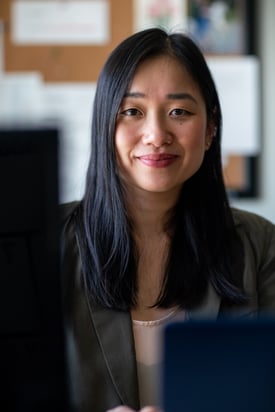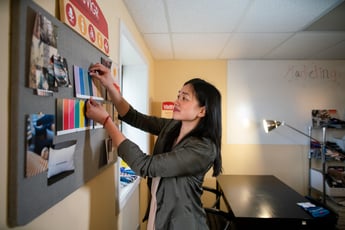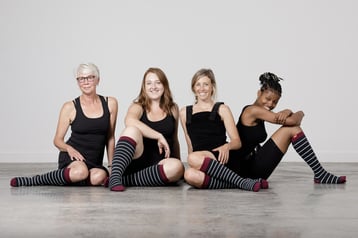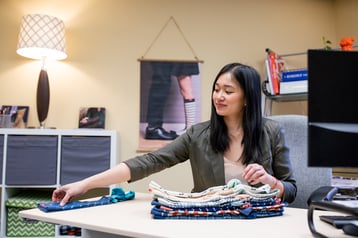Share this
Michelle Huie, Founder and CEO, VIM & VIGR
by Fundid on May 29, 2020
Working in the healthcare industry for over 14 years, Michelle has dedicated her adult life to introducing innovative technology and products to people that need it the most. In 2013, after moving to Missoula, Montana from New York City, she found herself sitting for long periods of time at my new job. She had no idea that sitting or standing for long periods could have such negative effects on her body, especially on how my legs felt. That's what lead her down the path to learning more about compression socks and creating VIM & VIGR.
Q: If you were to explain who you are and what you do in a few sentences, what would you say?
A: I am a born-and-raised New Yorker who now lives in Missoula, Montana. My main background is sales and marketing. I've been in the sales and marketing industry in biotech and pharmaceutical healthcare for pretty much my entire career. Kind of explaining who you are is kind of broad. I'm someone who loves challenges. I'm someone who loves to create new things that don't exist and I get bored easily, and I just love challenging myself all the time.

Q: You're the founder and CEO of VIM & VIGR. Tell me about VIM & VIGR, your role, and how you came upon VIM & VIGR.
A: I started VIM & VIGR, which is a stylish compression leg wear company, about six years ago, and that came about mainly as a personal need for myself. At the time when I moved from New York to Missoula, Montana, I was doing pharmaceutical sales and driving all over Montana, Idaho, Wyoming, and just noticed that my legs were really tired and achy at the end of the day. I was talking to a friend who said, "Oh, you should wear compression socks." At the time I was like, "Oh, wow. I'm in my early thirties. The idea of me wearing compression socks seems odd." But when I looked into it, I realized that there are so many benefits of compression socks and in fact a lot of people, most people, should be wearing them if they're sitting for long periods or standing for long periods. There weren't really brands out there that had great design, great style, very comfortable, high-quality fabrics, and so that inspired me to start VIM & VIGR.
In terms of what I do every day, there's no day that's the same. There may be one day where I'm spending the entire day looking at our cash flow and financials and analyzing data. There may be another day that I have sales calls and closing deals. Or some days that I'm deep into Amazon and trying to optimize our listings. I mean, as an entrepreneur you have to wear a lot of hats. There are other days where I'm in fulfillment and picking, packing, and shipping socks. You just have to be really flexible and go where the business needs you.
Q: It's challenging. So tell me about the moment you decided to actually do this, or was there a moment for you? How did you go from a day job to all of a sudden having a business?
A: I kind of created a bunch of points of no returns for myself. For me, I had a career, I had a job that I really liked, and it wasn't looking for anything new. I was just really inspired about creating this brand and product and knowing that a lot of people can benefit from it. I kind of became obsessed with bringing this product to the market. The first thing I needed to do was to find a manufacturer, right. I tried looking for a manufacturer in the United States first, and everywhere I went, people were like, "No. We can't do what you're looking for", or "Yeah, you're a startup, you're unproven. There's no way I'm going to work with you", and so that was really hard. To me it's like if I can't find a manufacturer, how am I going to bring this product out to the world?
Then my next step was, okay, what are some countries that are known for making compression socks and have that particular expertise? Compression socks are technically a medical device. I identified Taiwan as being a great place that produces really high-quality products and high-quality compression socks. That’s where I found my main manufacturer who I still work with today. We email each other weekly and I go out and visit them at least once a year.
The first batch of samples that we got were complete shit. They were horrible. The designs weren't great, the fit was horrible, but we kept iterating on it and perfecting the blend of fabrics and the design and finally got a product that I felt really, really good about. That's kind of how it came about.
I would say the couple of point-of-no-return moments that I had, I think the first thing was when I first identified the manufacturer. I was working my full-time job and I was talking to my mentor about how I found a manufacturer, and the first thing he said is, "Well, you need to go out and meet with them." And the idea of that was kind of crazy. I was like, "Oh, I guess I do. I need to establish a relationship." So I booked a weekend trip to Taiwan, which is a long flight, and flew out there and met with the manufacturer. This was really great advice because it helped me solidify my relationship with them and showed them that I was serious about this.
 The second moment of point-of-no-return was as soon as I got my first batch of samples that were good enough to show, I decided to book a trade show even though I didn't have a product to sell yet. I did this to really help me learn more about the industry because I had no experience in retail when I started VIM & VIGr. I mean, I never even worked at The Gap. I had no idea how any of that worked, so I booked a trade show, dropped a couple thousand dollars, packed my car, and went in and exhibited at this show. People were excited about it and in a way it's like, "Wow, I have potential customers now."
The second moment of point-of-no-return was as soon as I got my first batch of samples that were good enough to show, I decided to book a trade show even though I didn't have a product to sell yet. I did this to really help me learn more about the industry because I had no experience in retail when I started VIM & VIGr. I mean, I never even worked at The Gap. I had no idea how any of that worked, so I booked a trade show, dropped a couple thousand dollars, packed my car, and went in and exhibited at this show. People were excited about it and in a way it's like, "Wow, I have potential customers now."
The third point-of-no-return was when I finally put the deposit down on my first round of product. I ordered 10,000 pairs of socks, which was crazy, and in my mind I thought, "Well, the product is nonperishable, so if it takes me 10 years to sell these 10,000 pairs of socks, so be it. At least I'm doing it and I'm going to put it out there." When I put that deposit down, that was a hefty point of no return that was like, "Wow, I am going to be getting this product in some warehouse, maybe my basement, in about three months, so I better actually do this." So that's kind of how it all kind of came about.
Q: So tell me about the moment it felt real and what the first year was like.
A: I think the first year was kind of a proof-of-concept year for me. I was still working my full-time job, and in fact I worked my full-time job while running VIM & VIGR for multiple years until I went all in on VIM & VIGR. But the first year was really a proof of concept year. Is there a need for this? Are customers interested? In terms of when it became real, I think when it started to become real was when we started to get customers from people who we didn't know, that wasn't my family or friends, buy the product. Word of mouth about VIM & VIGR started to grow. Retailers were reaching out to us wanting to carry the line, and at that point I was saying, "Wow, there's clearly a need here", and it became very real that I'm really creating a brand and creating a product for people.
Q: Earlier when you were talking about how you got into it, you spoke about a mentor that encouraged you to go meet your supplier. Was this mentor important in your journey? Are they still someone you connect with?
A: So important. Not to get all depressing about this, but there was one thing that my mentor shared with me early on that I think most, if not all entrepreneurs feel. I remember meeting up with him early on when I was bright eyed and bushy tailed and excited about my idea. Really the idea was in my head and I was working on it and just excited about it, and didn't really share it with that many people. It wasn't out there yet. And I said, "Yeah, the highs really can be really high and the lows can be really low", and he corrected me and he said, "Actually the highs can be really high and the lows can be very lonely."
I think it was the first time that I heard him say that and I thought more about it. That really stuck with me on how much that can be very true as an entrepreneur. Whether you have a team of people, whether you are a solo entrepreneur, it doesn't matter. You feel the excitement, but when it's low and when things are tough, you really feel like it's all on your shoulders. I think having a community, having a network, and having mentors is really pivotal to get you out of that, to help kind of run ideas by them, especially people who kind of get it. It's like-minded people going through similar things that are really important. And also I think having a mentor and having a community is great because there's only so much you can share with your partner and your family, right? You don't want to kind of unload on them all the time about what you're dealing with. I think that it's great to have them as part of your community too, but I think it's important to reach outside of that also.
Q: So as you're on this journey, it's kind of an interesting time to even be talking about this, but how do you define success for yourself and your business, and has that changed over time?
A: That's changed so much. I mean when you start a business you kind of have these big aspirations of what you want it to be, but you don't necessarily align those aspirations with what you as an individual necessarily want or need sometimes. There's so much pressure for entrepreneurs or small businesses to constantly grow. You read all these success stories and you're kind of swept by all of this media about wow, 500% growth rate, 1000% growth rate. But one thing that's become very real over the past couple years is that it could be a facade. It could look like these companies are just crushing it in every way and you could feel as a small business like, "Wow, I'm not keeping up." But there's so much, so many layers beyond what you see on the outside of a company because there's so many inner workings.
I would say in the early days, even up to in the last year, I had pretty big aspirations for how big the brand could be or where I could go. I realized that I don't necessarily know if that's what I personally want. It's very, very, very difficult to separate you as the founder or entrepreneur with the business itself, so you need to make sure that those things align. I would say that that's been the biggest change for me. At the end of the day, I want to create high-quality products. I want to be able to create products and engage in my community of people who can benefit the most, and I want to be profitable.
I know it seems a lot simpler, but at the same time it's hard to stay focused on fewer things than it is to try to grasp for everything. Because I think for a lot of small business owners and entrepreneurs, we kind of have the shiny object syndrome, you know? I think focus has been a big component for me.
Q: It is so challenging to define success as a business owner too, just because it never feels like enough. There's always that next milestone to achieve and next place to go. So on that journey, thinking of all the skills that you have, and you're very talented, what would you say is the most important skill that you've developed to be a good business owner?
A: I think being relentless about the people you bring into your company. That's really huge. And what I mean by that is following your gut. Early on you're just excited that people want to be part of your company because you're like, "Wow, people believe in my mission and they want to join my company" and you just say yes to all these people, and at the end of the day you need to kind of take a step back and really evaluate is that person the right cultural fit for where you are right now, and also what you're aspiring to be in the future. And if the answer is no, you need to make the hard decisions.

I would say of the six years that I've had this business, the only time I ever lose sleep is when I deal with people. I don't really lose sleep about the success of the business or money or cash flow. It's really the people component of things that keeps me up at night the most. I think that as an entrepreneur, a small business owner, even if you're one person, it doesn't matter, or two people or 50 people, I think that's key.
Another thing that I've learned the most is really understanding your financials. I think people think, "Well, I'm a marketer. I'm a salesperson" and yes, that's really important to pushing your product, but you must understand your cash flow especially in manufacturing. But in the business it is really critical, so important. So I think the two main areas to develop is your financial acumen and taking your time with hiring the right person.
Q: So speaking of losing sleep at night, have you ever thought about quitting? And if so, can you tell us about it?
A: That's a great question. Yes, in a nutshell. The times that I think about quitting... I've had people interested in buying the company, without recognizing if they're a good fit for the business or not, and there are times that I lay in bed at night like, “wouldn't my life be a little bit easier if I just sold the company?” I'm definitely dealing with a lot of stress and at the end of the day wouldn’t this make my life easier. The answer is pretty much no. I think entrepreneurs are wired in a certain way. If it's not VIM & VIGR, it'll be something else that is going to keep us up at night because we love to create things, we love to be challenged. I think this is a commonality that we see, and I think that that's the reason why a community is essential to thriving. What we’re doing is very hard. And once you start down the entrepreneurial path, it’s very difficult to do anything else.
So yes, I mean there are times it's not necessarily I'm quitting, but there are moments where I think, "Can my life be a little bit easier?" And then my question is, "Well, do I want it to be?", and those are two different questions.
Q: It's interesting because it's like those moments can come up where you think about it, but to actually follow through is like, "Yeah, but I would never actually..."
A: One thing I've gotten better at is really knowing myself. At the end of the day you are who you are. You just kind of accept it and love it, and that's all you can ask for yourself. And to continue to iterate and work on the parts of yourself that you don’t love.
I know myself a lot better, and in the past if someone presented me with an opportunity, I would spend time engaging with them even though I wasn't quite sure. Now if I see an opportunity, I really assess it in the beginning and then I decide whether it's even worth putting another second of my time into because everyone's time is so valuable. Why should we be spending time pursuing something that at the end of the day if it came to fruition you don't really even want it?
Q: That's such a good point. So with that, what does the future of VIM & VIGR and Michelle look like?

A: I don't know. I mean in the middle of this interview we're dealing with the coronavirus pandemic, so everything is up in the air. I’m trying to look at what’s happening as a form of creative destruction. My business will never look like it did before the pandemic and I’m okay with that.
Q: Yes, that's so interesting with where the world is right now. People are reacting so differently to what's going on with the coronavirus and for a really good reason. I don't think there is a right way or a wrong way to act. But for me, I've found myself in this new spot of kind of being open to whatever.
A: I think this has forced many people to just re-evaluate everything - their personal life and their work life. Sometimes you're on a treadmill and you just kind of keep going and sometimes you find yourself going through the motions. This moment in time is really forcing me to be more intentional about what I do and where I want to take the business and the opportunities that are in front of me.
Q: So one last question. What would you want to learn from a community of other business owners? When you're around other business owners, what are you always curious about?
A: I'm always curious about people's unique experiences that they deal with. No matter what people deal with sometimes people feel like it's their own thing and only something that they go through. But there are so many parallels and similarities that are transferable to so many people. It can help so many people, and so I just want to hear about people's stories. I want to hear about people's challenges and I want to have a place in which we can comfortably share challenges. Somewhere to have a supportive place where we could hear different perspectives.